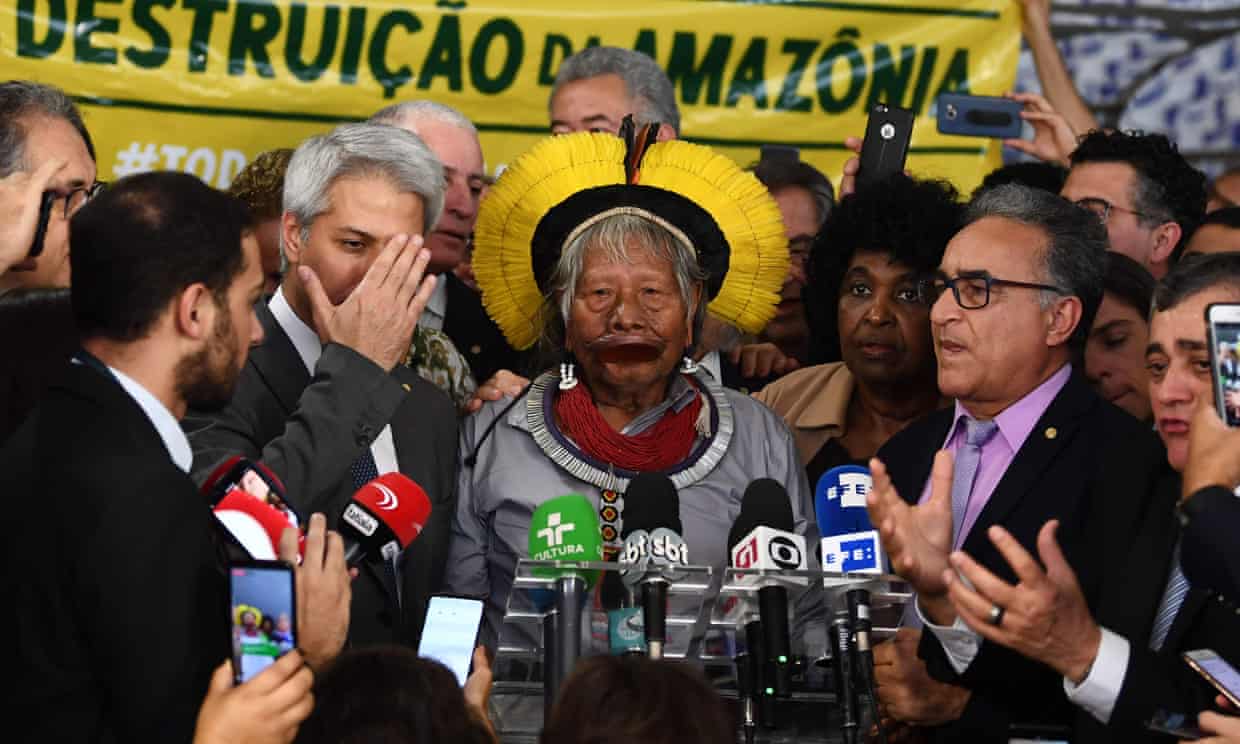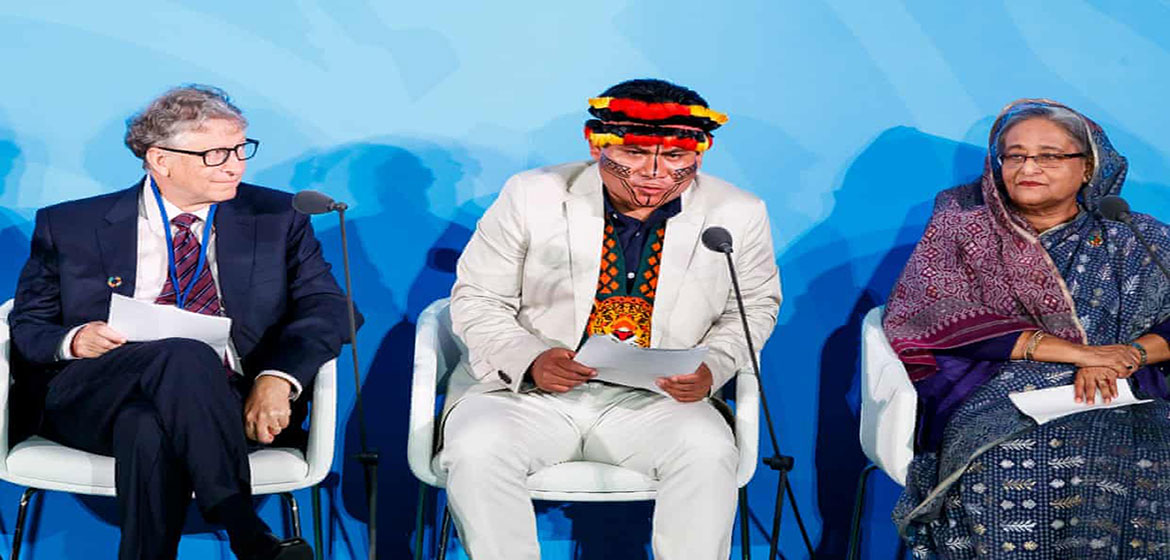Tuntiak Katan emphasized the need for indigenous inclusion and pointed out ‘we protect 80% of the world’s biodiversity’
By Jenni Monet
As presidents, prime ministers and corporate executives gathered at the UN climate action summit on Monday, for the first time, an indigenous representative joined the event in a formal capacity.
Tuntiak Katan of the Ecuadorian Shuar people spoke on behalf of the International Indigenous People’s Forum on Climate Change (IIPFCC), a caucus of indigenous rights advocates who, for years, has been working towards more robust participation and inclusion at the UN level in response to the climate crisis – even more so after the importance of traditional knowledge was mentioned in the 2015 Paris accord.
On Monday, Katan shared the stage with the Bangladeshi prime minister, Sheikh Hasina, and the philanthropist Bill Gates in discussing best approaches for adapting to a planet that is heating. “There’s no time left,” said Katan. “We must make a pact for life and for our future.”
In his two-minute address, Katan outlined three climate action commitments of the IIPFCC as requested by the UN secretary general. Of these steps, the indigenous rights leader who also serves as vice-president of Coordinator of the Indigenous Organizations of the Amazon River Basin (Coica), emphasized most the need for indigenous inclusion.
“We are more than 400 million indigenous peoples in the world and we protect 80% of the world’s biodiversity,” Katan said.
The address was seen by some as representation that doesn’t go far enough, but in the larger scope of the indigenous rights struggle, it was also seen as a small but significant step towards being seen and heard.
Formal indigenous representation has chronically been absent at UN climate talks even though indigenous peoples have been voicing concerns about a warming planet for decades. “The Inuit have been bringing forth warnings about global warming to the international community since the first Earth summit in Rio de Janeiro in 1992,” said Kuupik Kleist, former prime minister of Greenland, .
But Monday’s summit represented the most visible commitment made by the UN in promoting indigenous inclusion in high-level climate conversations and advanced progress from the held in Poland last year.
At that gathering, the IIPFCC secured their right for the first time to participate in vital decision-making in how traditional knowledge will be exchanged in adapting to the climate crisis as outlined in paragraph 135 of the Paris agreement.
Andrea Carmen, executive director of the International Indian Treaty Council, credits these strides to an increasing number of climate scientists who are turning to traditional knowledge systems as a way to deeper understand the natural world.
“Most of the states listening to the scientists are truly scared and are turning to indigenous peoples and saying: ‘Come and sit at the table and tell us what you’re thinking,’” said Carmen.
But with UN recognition of these indigenous “ways of knowing”, as Carmen describes them, advocates insist that such acknowledgment must also come with assurances; that certain rights, most distinctly spelled out in the , are firmly upheld. One provision calls on countries to take effective steps to ensure indigenous knowledge systems are safeguarded so that they can continue to be practiced by the very tribal communities of which they belong.

Brazilian indigenous leader Raoni Metuktire delivers a press conference in Brasília on 25 September. Photograph: Evaristo Sa/AFP/Getty Images
“Our traditional knowledge and the ways that we use it and how we think about it, needs to be respected,” said Carmen, adding that traditional knowledge doesn’t begin and end with the environment but rather the whole relationship indigenous peoples have with the land – economically, socially and culturally.
For all the promising gains, though, it was Kayapó tribal leader and 2020 candidate for the Nobel peace prize, of the Brazilian Amazon who perhaps demonstrated best the need for more indigenous inclusion at the UN level.
Raoni was denied access to Monday’s climate summit despite explaining to organizers that his own ancestral homelands were still going up in flames – fires blamed on the .
“Let Raoni in! Protect the Amazon!” shouted his supporters as he stood in the main lobby outside of the UN general assembly.
Amazon Watch, one of the leading not-for-profit organizations promoting the protection of the ecosystem, said Raoni was not properly credentialed to attend the summit although he was allowed access to the main UN campus. But Leila Salazar-López, Amazon Watch’s executive director, said given the dire concerns over the rainforest, concessions for his inclusion should have been made.
“The Amazon is on fire,” said Salazar-López. “And it’s a result of rolling back environmental laws and the rights of indigenous peoples because of Bolsonaro.
“There’s a need to tell world leaders.”
“They need us,” said Carmen. “We represent a source that can not only save lives and future generations but maybe also contribute to the shared survival of humanity.”
Source:
Related to SDG 13: Climate action and SDG 10: Reduced inequalities



